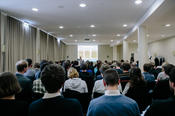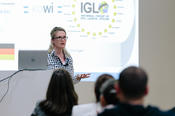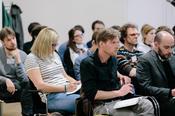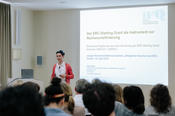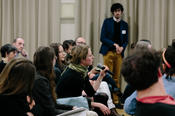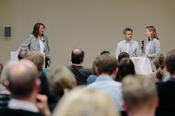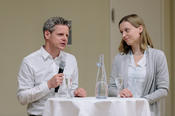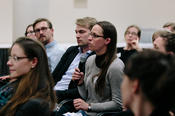Erfolgreich forschen mit ERC-Grants
On April 22, 2015, Junges Wissenschaftsforum Dahlem was dedicated to the European Research Council’s funding schemes. The ERC Starting, Consolidator and Advanced Grants are amongst the highest academic distinctions in Europe and offer excellent research and career opportunities. However, the selection process is very competitive and the selection rate is low. So, many junior researchers may wonder “How do I successfully apply for an ERC Grant?” About 65 guests came to the Harnack-Haus of the Max Planck Society to find possible answers to this question.
Dr. Sonja Ochsenfeld-Repp of the EU Liaison Office of the German Research Organizations (KoWi) presented the different funding schemes and explained the necessary steps of the application procedure. She advised all potential applicants not to underestimate the first step, a five-page proposal that should also appeal to reviewers from other disciplines. Applicants should also be well prepared for the interview in the second step of the selection process, which is why KoWi also offers interview training for applicants.
Antje Wegner from the Institute for Research Information and Quality Assurance (iFQ) told the guests about further keys to success, taken from the iFQ’s study about the funding requirements and effects of ERC Starting-Grants. According to the study, sponsored applicants approached former award winners from early on and used their successful applications as a model. She also highlighted the importance that those surveyed give to the quality of the proposal as opposed to other factors, such as publication output or the reputation of the home institution. But the study also showed that, in the long term, not only ERC Starting Grantees prove to be successful. Those who didn’t receive funding had often improved their professional position one or two years after their ERC application as well. The Grants are “competition at its highest level”, said Wegner. Only the best apply.
Afterwards, ERC Advanced Grantee Prof. Dr. Matthias Warstat and ERC Consolidator Grantee Prof. Dr. Katharina Franke of Freie Universität gave some insight into their own personal experiences with the competition for ERC Grants. Despite some particularities regarding their disciplines, theater studies and physics, their experiences had been similar. Both had developed the idea early on, so that they could thoroughly revise it until their application. They both had been encouraged and supported at their university. Therefore, the application was simply the next logical step of their, already successful, research. Excellence in research thus remains the main prerequisite of an ERC Grant, but advice and information are very helpful along the way.

